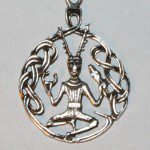 There have been several good essays recently on the topic of unverified personal gnosis. Sam Webster started it with this piece calling UPG “an ugly, misguided notion.” There have been numerous responses, including this one by John Halstead here at Patheos.
There have been several good essays recently on the topic of unverified personal gnosis. Sam Webster started it with this piece calling UPG “an ugly, misguided notion.” There have been numerous responses, including this one by John Halstead here at Patheos.
While the term “unverified personal gnosis” can be used to denigrate religious experience and to privilege tradition and the keepers of tradition, taken at face value it’s an accurate and humble description of the moving but highly subjective experiences we have of our gods, ancestors and spirits. Beyond that, I don’t have any great wisdom to impart.
Instead of diving deeper into UPG, I find myself being pulled back to a topic I seem to revisit often: uncertainty. Uncertainty plays a key part in my understanding of universalism. Last year I wrote about the tension between faith and doubt, while this year I wrote about Professor Ronald Hutton’s statement that “we are the only society that both believes in witchcraft and doesn’t believe in it, and I’d like to keep it that way.”
The human desire for certainty comes from two sources. The first is binary thinking. This is the evolutionary adaptation that made it possible for our pre-human and early human ancestors – at least some of whom did not have language and language-influenced thought processes – to quickly distinguish between friend and foe, predator and prey, balm and bane. Nuanced analysis was a luxury primitive humans simply didn’t have time for – they needed quick black and white answers, not shades of gray that might take minutes or hours to consider. When you spot movement in the trees, you’d better decide “predator or prey” very quickly. Guess wrong one way and you go hungry. Guess wrong the other way and you’re removed from the gene pool.
Ten thousand years of civilization and its complexities have not come close to overriding several million years where binary thinking was essential. We still like to classify everything as right/wrong, good/bad, hot/cold, helpful/harmful and so on. That’s one of the reasons “in between” times like sunrise and sunset are considered magical. They’re neither day nor night – our left-brain, conscious binary thinking can’t handle the ambiguity and breaks down (obviously this is a partial breakdown, not a total one), opening us to right-brain, unconscious thinking and the magic it brings.
True magical thinking (as opposed to the pleasant but impossible fantasies referred to when “magical thinking” is used as an insult) requires turning off the binary impulse and opening up to a wide range of possibilities. But that’s another post for another time.
The second reason we want certainty is that we want to build for the future. Our evolutionary impulses tell us to live for today because we may be dead tomorrow. If we’re going to sacrifice the present for some future benefit, we want to be sure our sacrifice isn’t in vain.
If you’re going to plant crops, you’d like to know there’s going to be a harvest. If you’re going to invest time and effort in building a house, you’d like to know that it’s not going to be washed away in next Spring’s floods. If you’re going to forsake all others and make a lifetime commitment to one partner, you’d like to know that partner is always going to be there for you.
Some religions combine the two desires. They propose that your present life determines your eternal fate, and then present that eternal fate as a binary proposition. If you think your only possibilities are eternal bliss or eternal torment you’d really like to be sure you made the right choice.
But where in the Universe do you see certainties? Drought, disease and insects can kill your crops. The Nile may flood every year (or at least it did before Nasser dammed it), but some rivers are fine for decades, then overflow. I don’t think I need to quote divorce statistics.
We can’t even be certain when someone moves from “living” to “dead.” When breathing stops? When the heart stops? When brain activity stops? We can’t be certain when life begins, either, which is one of the stickiest of points in the abortion debate (a subject I’m resisting writing on).
If we can’t be certain about things we can observe and measure, what chance do we have to be certain about things unseen?
In their understandable-but-unrealizable search for certainty, some people invoke binary thinking again and say “if you can’t be certain, then anything goes, and we can’t have that.”
No.
As shown in the example given by Professor Hutton, the fact that we can’t be certain what Stonehenge was used for doesn’t mean you can believe anything you want about it. Some possibilities are more likely than others.
Some religious beliefs are more likely than others. More importantly, some religious beliefs are more helpful than others.
Do your beliefs help you live a peaceful life, or do they fill you with fear and anxiety? Do they help you live in harmony with other people and other creatures, or do they isolate you from whole segments of the world? Do they challenge you to build a better world, or do they tell you things are OK like they are? Or worse, do they tell you things would be fine if other people would quit screwing it all up?
It’s the same with UPG. Other members of your tradition may or may not accept your UPG as genuine. Members of other religions almost certainly won’t. But the value of your religious experiences isn’t dependent what on others think about them. It isn’t dependent on whether you can be certain they’re genuine. Their value is dependent on whether they are meaningful and helpful to you.
Now if you’ll excuse me, a Forest God is calling me. I can’t be certain it’s Him, but previous calls have turned out pretty well so I’m going to answer this one too.

















